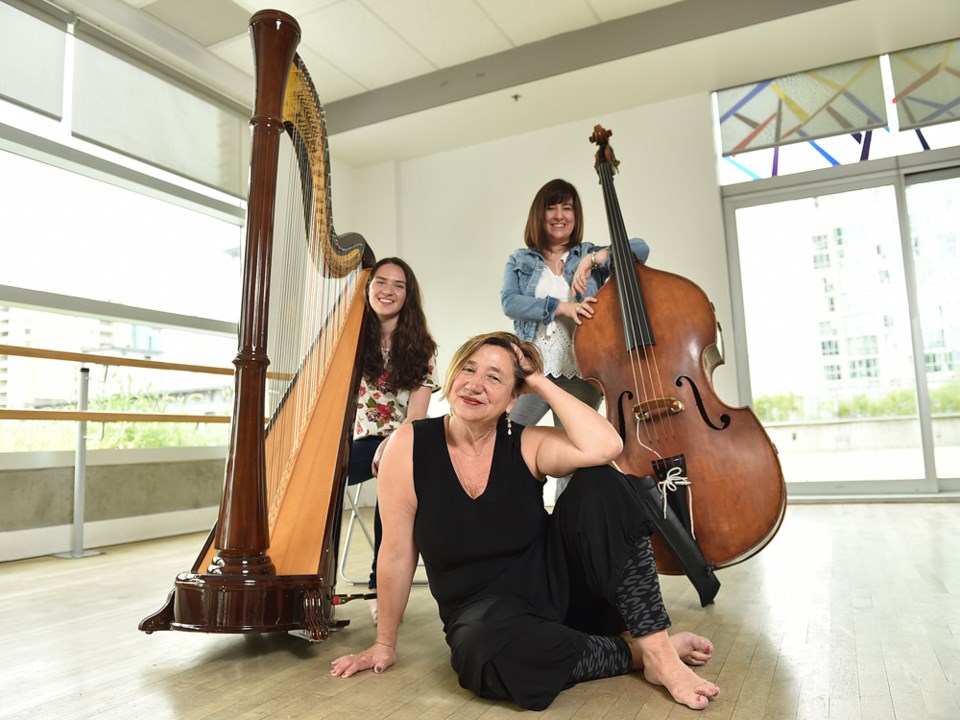Three teachers from three different generations will improvise important lessons on stage this June.
The curriculum of their interdisciplinary show,Ěý requires audience members and performers alike to embrace the chaos in their lives by encouraging them to be creative amidst it.
With performances from June 14 to 16 at The Cultch, a harpist, bassist and contemporary dancer promise audiences won’t be bored while experiencing vignettes of chamber music improvised over contemporary dance, comedy and poetry.
Jazz bassist Jodi Proznick, 42, was a master student of dancer Celeste Snowber, 63, in Simon Fraser University’s arts education program, which hosted their collaborative showĚýĚýin 2013.
They reunited to work on this project in order to continue exploring the challenges of being female in the 21st century, this time recruiting harpist Alexa Reimer, 21, thanks to a grant from Kwantlen Polytechnic University.
“Co-creation is a far more life giving educational experience than teaching a class in the traditional sense,” says Proznick, an educator for KPU’s music program who noticed Reimer during an improv class.
Sitting on the sprung wooden floor on the top level of Scotiabank Dance Centre, the trio sat down to talk with the Courier mid rehearsal. They sit close and seem connected by the co-creative experience, though their generational differences are reflected through Reimers silent observation, broken only by appreciative agreements.Ěý
“Just hanging out with these two women, they’ve really shown me how to be more vulnerable and see the different processes of how art can be made,” Reimer says, adding "They have so much life experience!"
"You don't want some of mine—believe me!" Snowber responds.Ěý
Snowber says that what art schools or music and dance training lack is an emphasis on playing with the imperfections of life.
“We get so caught up in the training, which is definitely needed, but there’s something about honouring the textures and fabrics of our vulnerability and encouraging creation out of that.”
Though SFU hasn’t funded any aspects of this upcoming performance, Snowber feels her scholarship is the fusing of her academic research with her artistic creations.
“Certainly one little journal article I write is more valued than a show I spend two years on,” Celeste says. “But we’re living in dangerous times, which means we need art more than ever.”
All three women agree that they act as co-mentors and teachers to one another, and that this multi-generational co-creative experience has allowed them to access their voices more deeply.
“Having mentors to look to who are further ahead in life’s journey is like having a lighthouse in the darkness,” adds Proznick.Ěý
The show may be created by three woman about their lived experiences, but Proznick says that universal messiness of life makes for a show that audience members of any gender will relate to.
“We explore the polarities of life and teach the audience how to worry,” Proznick says.
“What do you do when the world seems to be crumbling down around you? How do you embrace such a natural emotion, create It into a sacred thing that feels and cares?”
After the overture and worry piece, audience members can expect a harp solo, a performance themed around not fitting into kayak gear, a funeral for superwoman, and a piece belly rolls giving people their wisdom and orgasms.
The absurdity of the show aims to mirror the absurdity of life, and Snowber hopes it will inspire audience members to walk away from the show understanding the relationship between being human and humour.
“We take ourselves sooooo seriously. I’m exhausted by my own seriousness,” laughs Snowber.
“I want people to learn to embrace their own paradoxes, difficulties, limits and be inspired by the fruit abundant in the dark.”
And while audience members will sit in a dark theatre, the small space, low technology and lack of video screens or a sound system will make for an intimate show.
“It’s almost like you’re in our living room,” says Snowber.
If you can’t catch Perfect Imperfections: The Art of a Messy Life at the Cultch this June, be sure not to miss the performance arts-and-inquiry-based research project when it’s work shopped at KPU this September.


